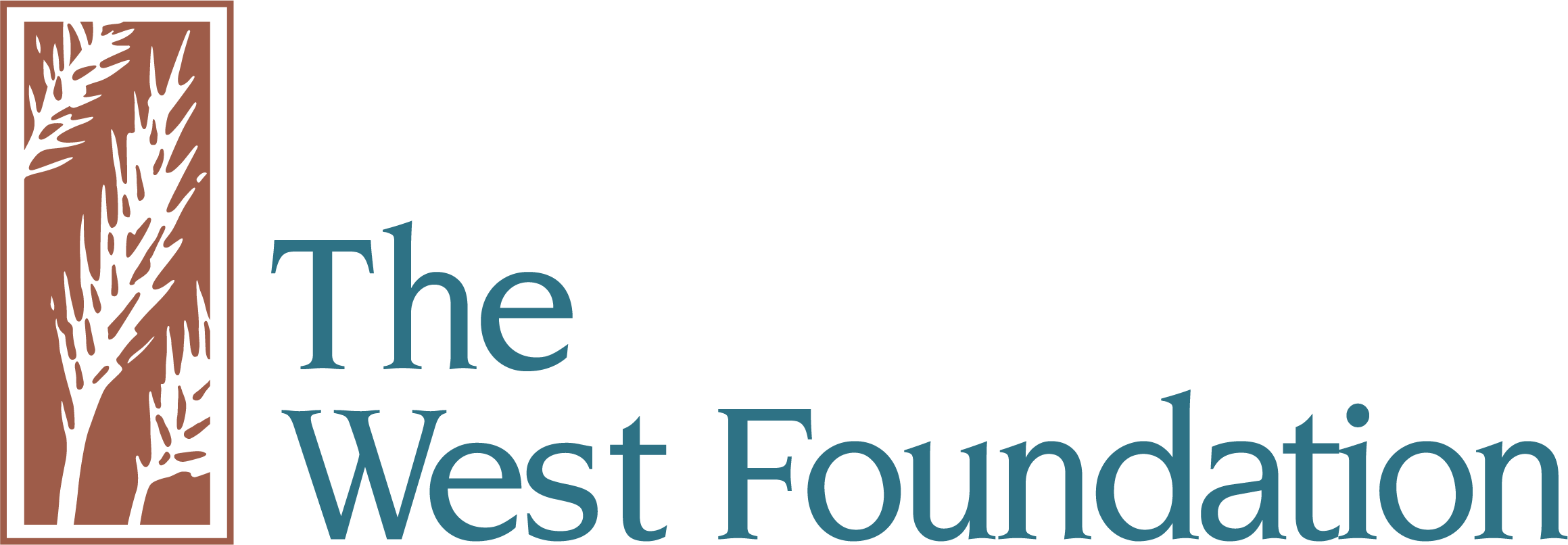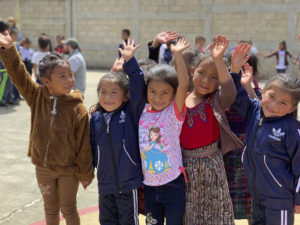Learn more about Cooperative for Education
1. Tell us about your mission.
In 1996, Jeff and Joe Berninger founded Cooperative for Education (CoEd), a Cincinnati, Ohio-and Guatemala City-based 501(c)(3) organization with the mission of helping Guatemalan schoolchildren break the cycle of poverty through education. Over the years, we have reached nearly 225,500 Guatemalan students through textbook, computer, reading, and youth development programs.
2. How is The West Foundation supporting your mission?
The West Foundation is supporting CoEd’s work and operations, expanding our four core educational programs to reach thousands more youth in Guatemala’s Western Highlands, which exhibits one of the most extreme combinations of systemic poverty, illiteracy, and inequality in the hemisphere.
- According to the UN, the two elements that improve the quality of education in developing countries the most are 1) providing textbooks and 2) making sure that the teachers are engaged and prepared. CoEd’s Textbook Program does both. With The West Foundation’s support, we now have 207 schools and 26,400 students in our Textbook Program.
- CoEd Computer Centers deliver high-quality technical training, providing marketable skills that enable rural Guatemalan students to compete for higher-wage jobs and break the cycle of poverty. 95% of program graduates find a job or continue their education in high school!
- Our Spark Reading Program provides children’s literature and training in effective reading instruction to primary-school teachers, transforming rural Guatemalan schoolchildren into enthusiastic, competent, and lifelong readers. Currently, 24,000 students and 912 teachers at 94 schools are benefiting from the Spark Reading Program.
- The Rise Youth Development Program removes economic barriers to education and involves young people in leadership development and community service activities. Thanks to The West Foundation’s support, 731 students are still in school and on their way to graduation.
3. Considering your impactful work to eliminate poverty, how is The West Foundation’s philanthropic support providing you with sustainability and mobility?
True to our organization’s name, we work “cooperatively” with parents, teachers, principals, and students to create strategies for educational development in their communities. We also build local capacity by training teachers and administrators to manage and maintain their programs. A fee-based revolving fund model makes the Computer and Textbook Programs financially sustainable. Students pay a small fee each month which goes into a fund managed by CoEd. These fees are then used to replace the books and computer equipment after approximately five years. The Spark Reading Program achieves a lasting impact by transforming teachers into literacy professionals that will educate an entire generation of Guatemalan schoolchildren. The Rise Youth Development Program enables students who otherwise would be forced to drop out to complete the 12 years of education necessary to permanently break out of poverty. Graduates then contribute to the academic and economic success of their younger siblings and future children.
In early March, Guatemalan schools closed to keep their students safe during the pandemic. With many students lacking access to the Internet, Guatemala’s Ministry of Education struggled—even more so than our own school systems—to reach kids with education during stay-at-home orders. Luckily, 26,800 students in 207 schools still have access to high-quality CoEd textbooks that allow them to continue studying from home! Our Spark Reading Program and Textbook Program teams also rose up the challenge by beginning to train teachers online. The Computer Centers Program team is creating video tutorials that students can watch at home, while developing a strategy to condense course content for when students return to school, ensuring every student gets the opportunity to learn what they would have covered in class during the pandemic. The Rise Program team has been making phone calls to students, checking on their health, and sending out homework assignments. We also started a COVID-19 Student Relief Fund to provide additional financial support to students whose families are struggling to meet their basic needs and to cover scholarships for students whose sponsors are unable to continue their support. The West Foundation’s support is especially critical during this time of the COVID-19 pandemic because support of core operations enables this flexibility.
4. How are you realizing your potential?
CoEd started as a kitchen-table operation run by two brothers who saw a need in the world, to help children in Guatemala rise out of poverty through education. In just 24 years, it has grown into an award-winning international development organization with offices in two countries and a staff of more than 60. The first successful textbook cooperative we started way back in 1996 has been replicated in 207 communities, benefiting more than 26,000 students with 102,500 textbooks each day. That very first textbook school still has textbooks today, and has even renewed their own books multiple times with money saved in their revolving fund—with no further investment needed from outside supporters! CoEd even expanded this sustainability model into developing computer centers, youth development, and primary school reading programs.
Over the years, support from the West Foundation has helped our programs’ reach grow to the impressive numbers above, but it has also done so much more. As we’re learning throughout the COVID-19 pandemic, the strong network of educational resources we’ve built over time means that we’re well-positioned to lead the way in continuing education for Guatemalan students during stay-at-home orders. For example, when in-person teacher trainings were suspended, teachers in our Spark Reading Program had already received a jump drive full of instructional videos covering the program’s methodology for the year. Even though these videos were originally intended as review materials, our team was able to quickly revise the training curriculum so that the videos could serve as the primary learning tools. Thanks to our programs’ many innovative components like the Spark videos, we’re able to continue having an impact in students’ lives even now, during these challenging times. Although this unprecedented global shutdown is certainly affecting all of our programs in Guatemala, it has also pointed to ways in which our ability to adapt and quickly pivot to reaching students through virtual means are leading the charge in responding to the needs of our changing world.
5. What’s one important thing you want others to know about your organization?
Today, indigenous Maya in the Western Highlands of Guatemala suffer from poverty, malnutrition (rates of which rank among the worst in the world), poor health outcomes, high rates of illiteracy, and low levels of educational attainment. Four out of five indigenous Guatemalans live in poverty and nine out of ten kids living in poverty never graduate from high school. Compounding the problem, the majority of Maya do not have access to affordable, quality education. Teachers in rural schools often lack formal training and resources—like books and computers—they need to facilitate learning. As a result, educational attainment is low, and illiteracy and dropout rates are high. Young people lack the education to secure higher-paying jobs, and the cycle of poverty continues. Parents in these remote towns and villages want more for their children, and they know that education is the only pathway out of poverty.
Through the generosity of our donors, we provide educational opportunities to impoverished Guatemalan schoolchildren that help them learn to read, stay in school, learn valuable skills, gain access to better jobs, discover their value, achieve their potential, and give back to the world. This is especially important for young girls in Guatemala, who often get left behind. It’s been proven that educating girls improves the health and survival rates of infants and children, leads to higher rates of school attendance and completion in the next generation, improves the status of women within families, communities, and the political arena, and much more! Through education, these vulnerable young people can lift themselves, their families, and their entire communities out of poverty—breaking the cycle, once and for all.
6. How can people reading this help you?
You can help by joining us on the evening of October 17, 2020 for our first ever virtual fundraising gala, Fall Fiesta! We invite our supporters and your friends and family to join us online from the comfort and safety of your own home to watch our livestream event, bid on auction items, and play games, all while helping to break the cycle of poverty in Guatemala through education. There is no cost to attend the livestream event!
You can also help by sponsoring a student in CoEd’s Rise Youth Development Program. Each year, with the help of sponsors, CoEd provides full academic scholarships to hundreds of indigenous Maya students in impoverished communities throughout Guatemala. In addition to removing economic barriers to education, the Rise Program also provides a support system to help students rise above the challenges they face. We’ll keep you regularly updated on your student’s progress, and you will also have the opportunity to exchange letters and photos with your student and even visit them in Guatemala! You’ll experience the joy and pride of helping your student grow as you become part of each other’s stories.
7. What are your deepest needs as an organization?
Our deepest need as an organization is support for our Thousand Girls Initiative, a primary focus of our current strategic plan. In Guatemala, girls are not traditionally supported in their desire to go to school. Often, when parents have to decide which child to educate on their meager earnings, they prioritize the boys, and the girls get left behind. In some parts of Guatemala (where we work), there is a boy and a half in school for every girl. In Guatemala as a whole, 80% of men are literate, compared to only 58% of women. The Thousand Girls Initiative is a massive expansion of the Rise Youth Development Program that will help 1,000 girls and 250 boys across the country rise out of poverty for good. The main limiting factor in the number of new students the program can reach is our ability to find sponsors for these students as described above, so helping introduce our work to new audiences who may be interested in sponsoring is always appreciated!

